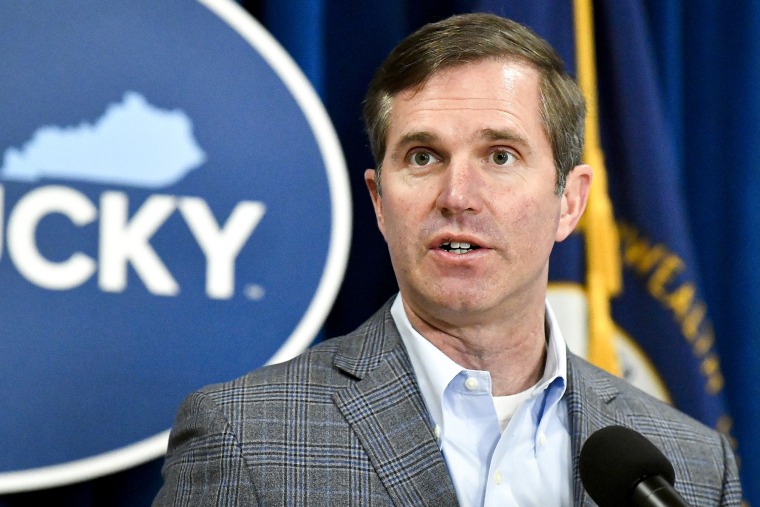BALTIMORE — After a bridge collapse in Baltimore killed six people and shut down an international port, Maryland Gov. Wes Moore has stepped into the national spotlight this week, leading the response to the catastrophe.
Moore, a political newcomer before he launched his 2022 campaign for governor, has already been identified as a rising star in the Democratic Party, joining a deep bench of Democratic governors whose names have been floated as potential 2028 presidential contenders.
Moore’s allies say the qualities and experience that led him to run for governor are the same ones that could help guide him through this crisis and into national prominence.
“I think leaders show who they are in times of crisis. Wes Moore has always been someone who runs toward the problem,” Brian Adam Jones, who was a longtime adviser to Moore when he led the Robin Hood Foundation, told NBC News, highlighting Moore’s experience as a combat veteran and the CEO of one of the largest anti-poverty organizations in New York City.
Jones echoed the feelings of other Moore allies and Democratic strategists who argue that Moore is uniquely positioned to address a complex crisis, which features a vessel that struck a bridge, eliminated a critical piece of Baltimore infrastructure, tied up traffic across the region, shut down an international port and led to the deaths of six construction workers.
Just after 1 a.m. on Tuesday, the cargo ship Dali crashed into the Francis Scott Key Bridge in Baltimore. By 6 a.m., the governor had declared a state of emergency. Since then, Moore has been all over Baltimore, between the site of the downed bridge, speaking to victims’ families and observing a moment of silence at the Baltimore Orioles’ opening day game on Thursday.
“This is going to be a long process. It’s a very complicated process. But people should rest assured we are going to get this done and they can bet on that,” Moore said at a press conference Thursday evening.
It’s a big moment for a new governor in a city that often clashed with his predecessor, GOP Gov. Larry Hogan, who is now running for Senate.
“Gov. Hogan is someone who really, almost always spoke about Baltimore with an incredible amount of disdain,” Jones said, adding: “And that was something that as a Baltimorean was really important for Gov. Moore when he was running.”
Still, one national Democratic strategist told NBC News, “Nobody ever wants to be a crisis governor. But it’s part of the job.”
The strategist added that Moore is “focused on Maryland right now. His military experience, unique biography and leadership skills set him apart. It’s going to take a really long time [to rebuild] and it won’t happen overnight. As someone with military experience and service, that’s central to his leadership in Maryland, as is bringing people together and remaining focused.”
A first-term test
How Moore faces this crisis will prove to be a crucial test of his leadership and his role as a rising star in the party, given the skepticism he faced during a tense Democratic primary campaign.
Moore started in the race with little name recognition but took off early on, boosted by endorsements from figures in and out of the state, including Oprah Winfrey. He went on to outpace former U.S. Education Secretary John King, former Democratic National Committee Chair Tom Perez and former Maryland Comptroller Peter Franchot.
But midway through the primary cycle, Moore’s campaign became bogged down with allegations that Moore had misrepresented his upbringing in a 2010 memoir, “The Other Wes Moore.” Moore’s campaign filed complaints with the state board of elections, alleging foul play by a group that circulated a memo raising questions about his past and whether Moore really grew up in Baltimore.
Jared Leopold, a veteran Democratic strategist and a former staffer at the Democratic Governors Association, told NBC News that Moore proved his political chops during that gubernatorial primary, saying Moore “showed his charisma and his leadership, and also showed that he could handle tough issues.”
“So far, I think it’s going well for him,” Leopold added. “He’s doing well at the leadership test.”
MSNBC co-host Michael Steele, a Republican who served as Maryland’s lieutenant governor from 2003 to 2007 and went on to serve as chair of the Republican National Committee, added that in addition to questions about his ties to Maryland during the campaign, “I think there were a lot of questions about someone who’s never held elective office coming in and running a $40 billion enterprise and trying to manage all of that.”
“But, you know, he’s seemingly getting his footing under him, and I think a lot of folks in Annapolis and around the state are still watching and nodding their heads with approval,” he added.
Representatives for Moore’s administration declined to comment for this story, pointing instead to Moore’s Thursday remarks on the path to rebuilding the bridge.
Eyes on 2028
Democratic strategists and Moore’s allies stress that despite a potentially bright political future, the governor isn’t using this moment to advance any political ambition.
“I know that that’s not even on his radar right now, as he’s thinking about this crisis,” Jones said.
Steele added, “Out of the gate, I can just tell you when you’re in that position, only the most crass … kind of politician will sit there and think about how they could take a tragedy like this and burnish their reputation for higher office. That’s something that I’ve never picked up from Gov. Moore.”
Just days before the bridge collapse, Moore held a roundtable discussion with reporters in Washington after speaking at an education conference. He was asked if he was tired of getting so many questions about his political future, just months into his term as governor.
“I don’t, I don’t get tired of it because I don’t think about it,” he said.
Still, in two years Moore will have the opportunity to run for a second term if he chooses, and past political campaigns have shown that successfully navigating a conflict can help you in future political endeavors.

Following Kentucky Democratic Gov. Andy Beshear’s re-election victory in one of the most competitive gubernatorial campaigns of 2023, many identified him as the “consoler-in-chief” of his state and credited Beshear’s victory, in part, to guiding his state through the Covid-19 pandemic and a series of devastating natural disasters during his first term.
“I think people understood that regardless of their politics and other things, they knew fundamentally that [Beshear] really, really cared about them, and his values drove him to help, right?” one Democratic strategist familiar with governor’s races told NBC News.
“We’ve seen all over, voters really reward that when they think you’re on their side,” the strategist added.
All eyes are now on Maryland, and Moore, as he and other local, state and national leaders begin the process of healing a community and rebuilding crucial infrastructure.
“Don’t bet against Wes Moore. Ever,” Jones said, adding: “Watch his work and watch what he does. It’ll speak for itself.”
Source link








